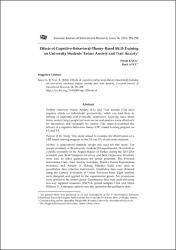Effects of Cognitive-Behavioral-Theory-Based Skill-Training on University Students' Future Anxiety and Trait Anxiety
Abstract
Problem Statement: Future Anxiety (FA) and Trait Anxiety (TA) have negative effects on individuals' productivity, which can lead them to feelings of insecurity and eventually depression. Knowing more about future anxiety helps people feel more secure and produce more effectively for themselves, and eventually for society. This research examined the efficacy of a cognitive-behavioral theory (CBT)-based training program on FA and TA. Purpose of the Study: This study aimed to examine the effectiveness of a CBT-based training program on the FA and TA of university students. Method: A quasi-mixed methods design was used for this study. The sample consisted of 28 university students (14 experimental, 14 control) in a public university in the Aegean Region of Turkey during the 2015-2016 academic year. Brief Symptom Inventory and Beck Depression Inventory were used to select participants for group processes. The Personal Information Form, Trait Anxiety Inventory, Positive Future Expectations Inventory, and Anxiety of Making Mistakes Scale were used as quantitative data collection instruments. Qualitative data were obtained using the General Evaluation of Group Processes form. Eight sessions were designed and applied to the experimental group. No procedures were applied to the control group. Quantitative data were analyzed using two-way repeated measures ANOVA, paired samples t-test and Mann Whitney U. A thematic analysis was also applied to the qualitative data. Findings and Results: Results revealed that a CBT-based Overcoming FA and TA Skill-Training program decreased university students' trait anxiety levels and anxiety about making mistakes, while increasing positive future expectations. Conclusions and Recommendations: The present study found that a skill-training program based on CBT affected individuals' future perceptions in an expected way. Similar research should be conducted with different age groups and different samples. Further research may focus on developing a measurement for FA.


















